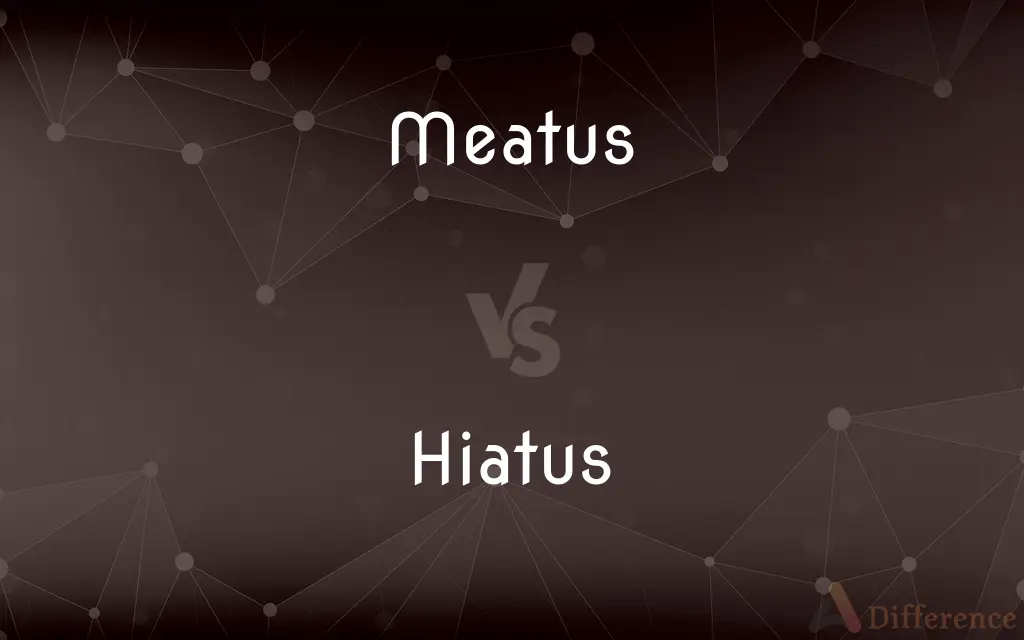Meatus vs. Hiatus — What's the Difference?
Edited by Tayyaba Rehman — By Maham Liaqat — Updated on March 26, 2024
A meatus refers to a natural passage or canal within the body, while a hiatus signifies a gap or interruption in space, time, or continuity.

Difference Between Meatus and Hiatus
Table of Contents
ADVERTISEMENT
Key Differences
A meatus is a term primarily used in anatomy to describe a natural opening or canal within the body, such as the auditory meatus in the ear, allowing for specific physiological functions like the passage of fluids or air. On the other hand, a hiatus has a broader application, often used in general language to denote a pause, gap, or break in continuity, sequence, or activity. It can refer to anything from a physical gap, as in a hiatus hernia, where part of the stomach pushes through the diaphragm, to a break in work or other activities.
While meatuses are specifically anatomical structures, serving as passages or channels for various substances in the body, hiatuses can occur in a wide range of contexts, including literature, work, and physical structures. For instance, a writer might take a hiatus from writing, or there could be a hiatus in a television series between seasons.
Meatuses are essential for the functioning of the body, facilitating the movement of air, fluids, and other substances to and from different body parts. Hiatuses, however, are often seen as interruptions or breaks from the norm, which can be either intentional, such as a sabbatical, or unintentional, like a disruption in a series of events.
The term meatus comes from the Latin word meaning "a passage," reflecting its role in the body as a conduit for substances. Meanwhile, hiatus derives from Latin as well, meaning "an opening, gaping mouth, or chasm," symbolizing the concept of a break or gap.
Comparison Chart
Definition
An opening or passage within the body.
A gap, pause, or break in continuity, space, or time.
ADVERTISEMENT
Usage Context
Primarily in anatomy and medicine.
Broadly used across various fields and contexts.
Function
Facilitates movement of substances in the body.
Denotes interruption or pause.
Examples
Auditory meatus, urinary meatus.
Hiatus hernia, sabbatical.
Etymology
From Latin "meatus," meaning passage.
From Latin "hiatus," meaning opening or gap.
Compare with Definitions
Meatus
An anatomical passage.
The auditory meatus leads to the eardrum.
Hiatus
Interruption in sequence.
There was a noticeable hiatus in the timeline of events.
Meatus
Part of the body's drainage system.
Tear ducts drain into the nasal meatus.
Hiatus
A break from routine.
She took a hiatus from work to travel the world.
Meatus
Essential for bodily functions.
Proper functioning of each meatus is crucial for health.
Hiatus
A gap or opening.
A hiatus hernia involves the stomach and the diaphragm.
Meatus
A canal within the body.
The urinary meatus is the external opening of the urethra.
Hiatus
A pause in activity.
The television series will return after a brief hiatus.
Meatus
A natural body opening.
The nasal meatuses are involved in the process of breathing.
Hiatus
A break in continuity.
The writer announced a hiatus from publishing.
Meatus
In anatomy, a meatus (, mee-AY-təs), plural "meatus" or "meatuses", is a natural body opening or canal.
Hiatus
A gap or interruption in space, time, or continuity; a break
"We are likely to be disconcerted by ... hiatuses of thought" (Edmund Wilson).
Meatus
A body opening or passage, such as the opening of the ear or the urethral canal.
Hiatus
(Linguistics) A slight pause that occurs when two immediately adjacent vowels in consecutive syllables are pronounced, as in reality and naive.
Meatus
(anatomy) A tubular opening or passage leading to the interior of the body.
The urinary meatus is the opening of the urethra, situated on the glans penis in males, and in the vulva in females.
Hiatus
(Anatomy) A separation, aperture, fissure, or short passage in an organ or body part.
Meatus
(anatomy) acoustic meatus the passage leading into the ear.
Hiatus
A gap in a series, making it incomplete.
Meatus
A natural passage or canal; as, the external auditory meatus. See Illust. of Ear.
Hiatus
An interruption, break or pause.
The band decided to go on hiatus, citing creative differences.
Meatus
A natural body passageway
Hiatus
An unexpected break from work.
Berserk's hiatus is never going to end now...
Hiatus
(geology) A gap in geological strata.
Hiatus
(anatomy) An opening in an organ.
Hiatus aorticus is an opening in the diaphragm through which aorta and thoracic duct pass.
Hiatus
A syllable break between two vowels, without an intervening consonant. (Compare diphthong.)
Hiatus
A temporary absence from the public or the mainstream.
Hiatus
An opening; an aperture; a gap; a chasm; esp., a defect in a manuscript, where some part is lost or effaced; a space where something is wanting; a break.
Hiatus
The concurrence of two vowels in two successive words or syllables.
Hiatus
An interruption in the intensity or amount of something
Hiatus
A missing piece (as a gap in a manuscript)
Hiatus
A natural opening or perforation through a bone or a membranous structure
Common Curiosities
What can cause a hiatus?
Hiatuses can be caused by various factors, including intentional breaks, structural gaps, or disruptions in continuity.
What is a hiatus?
A hiatus is a gap, break, or pause in continuity, space, time, or activity.
What is a meatus?
A meatus is an opening or canal within the body that allows for the passage of fluids or air.
Is a hiatus always temporary?
While often temporary, the duration of a hiatus can vary widely depending on the context.
Can everyone have the same types of meatuses?
Yes, all humans have the same basic anatomical meatuses, though individual conditions can affect their function.
How is meatus used in anatomy?
It describes natural openings or channels within the body, like the nasal or auditory meatuses.
Can meatus and hiatus mean the same thing?
No, meatus refers to anatomical passages, while hiatus refers to breaks or gaps in various contexts.
Are there different types of meatuses?
Yes, there are several types, including the auditory, nasal, and urinary meatuses, each serving different functions.
How do meatuses affect bodily functions?
Meatuses are crucial for the passage and regulation of fluids and air, impacting breathing, drainage, and other bodily functions.
How is hiatus used in medicine?
In medicine, hiatus often refers to structural gaps, such as in a hiatus hernia.
Can a hiatus be beneficial?
Yes, a hiatus can provide rest, renewal, or the opportunity to pursue other interests.
What happens during a hiatus hernia?
In a hiatus hernia, part of the stomach bulges through the diaphragm into the chest cavity.
Is a sabbatical considered a hiatus?
Yes, a sabbatical is a type of hiatus typically taken for study or travel, offering a break from work.
Can a meatus become blocked?
Yes, meatuses can become blocked, leading to health issues that may require medical intervention.
Can a hiatus affect productivity?
Yes, a hiatus can either hinder or enhance productivity, depending on its purpose and how it's utilized.
Share Your Discovery

Previous Comparison
Midge vs. Sandfly
Next Comparison
Letterhead vs. HeaderAuthor Spotlight
Written by
Maham LiaqatEdited by
Tayyaba RehmanTayyaba Rehman is a distinguished writer, currently serving as a primary contributor to askdifference.com. As a researcher in semantics and etymology, Tayyaba's passion for the complexity of languages and their distinctions has found a perfect home on the platform. Tayyaba delves into the intricacies of language, distinguishing between commonly confused words and phrases, thereby providing clarity for readers worldwide.
















































